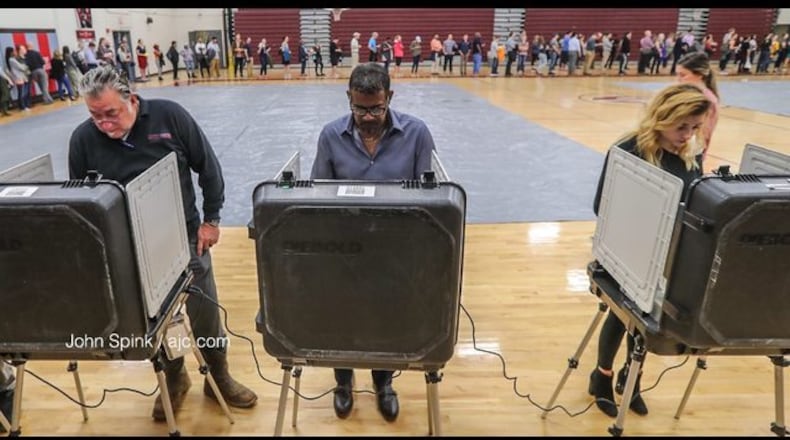Georgia voters with limited ability to speak English will be able to bring an interpreter of their choice to the polls, according to a settlement approved by a federal judge Thursday.
State election officials consented to lift restrictions on who could serve as an interpreter late Wednesday, hours after a lawsuit sought emergency action from the courts before next week's runoff election.
The settlement invalidates a Georgia law that said voters in state elections could only use interpreters who are close family members, caretakers or voters registered in the same precinct. The state law conflicted with the federal Voting Rights Act, which said anyone can serve as an interpreter as long as they’re not the voter’s employer or a union official.
"We're pleased that common sense ruled in this case," said Stephanie Cho, executive director for Asian Americans Advancing Justice-Atlanta, which filed the lawsuit Tuesday. "It allows people to choose whoever they want when they go to vote. Now we can get the word out to the community we serve."
More than 500,000 Georgians identify themselves as having limited English proficiency, and most of them are Asian-American or Latino, according to Asian Americans Advancing Justice-Atlanta.
Voters will be able to bring interpreters with them to help them understand their ballots in Tuesday's runoff election and in all future elections, said Georgia Secretary of State Robyn Crittenden.
“Ultimately, both sides were able to reach a satisfactory conclusion in this litigation, and we have taken immediate action to comply with the negotiated terms of the consent order,” Crittenden said in a statement.
Crittenden, who was appointed as a short-term secretary of state when Gov.-elect Brian Kemp resigned after this month's election, issued a bulletin to county election election officials Thursday informing them of the requirement to allow interpreters.
Public notices will be placed at the entrance of each polling place in the state informing voters that they may receive assistance from any person of their choice.
Both parties agreed to settle the lawsuit “to avoid the burden, delays and uncertainties of litigation, and to efficiently and expeditiously promote the parties’ shared goal of ensuring that Georgia’s voters are afforded the rights guaranteed by the requirements of the Voting Rights Act,” according to the court order signed by U.S. District Judge Timothy Batten.
In the Nov. 6 general election, voters were allowed to bring an interpreter of their choosing under the Voting Rights Act because there were federal candidates on the ballot, running for Congress. If the settlement hadn’t been approved Thursday, state law would have restricted interpreters in the runoff, which only includes state candidates.
Tuesday's runoff features elections for Georgia secretary of state and the Public Service Commission.
About the Author
Keep Reading
The Latest
Featured



